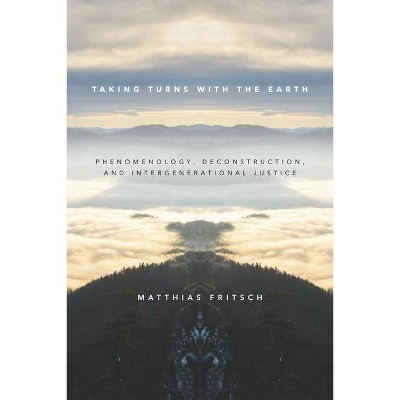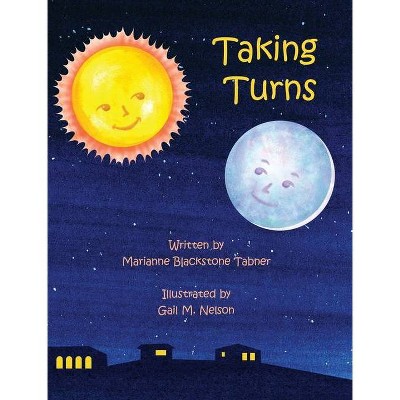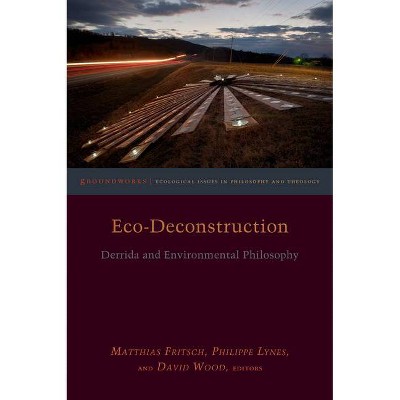Taking Turns with the Earth - by Matthias Fritsch (Paperback)

Similar Products
Products of same category from the store
AllProduct info
<p/><br></br><p><b> About the Book </b></p></br></br>Reconsidering the natality and mortality of the human condition, this book offers novel conceptions of intergenerational justice in terms of reciprocities and the taking of turns among generations.<p/><br></br><p><b> Book Synopsis </b></p></br></br>Reconsidering the natality and mortality of the human condition, this book offers novel conceptions of intergenerational justice in terms of reciprocities and the taking of turns among generations.<p/><br></br><p><b> Review Quotes </b></p></br></br><br><i>Taking Turns with the Earth</i> is a model of scholarship in continental philosophy. Written in a clear argumentative style that never sacrifices depth or complexity, it shows how central ideas found in Heidegger, Levinas and Derrida--ideas often dismissed as obtuse--can be put to work to help us rethink some of the most pressing ethical issues of our times.--Marie-Eve Morin "<i>Research in Phenomenology</i>"<br><br><i>Taking Turns With the Earth</i>offers to the reader a rich and incisive analysis of intergenerational justice, especially as it relates to issues pertaining to the environment. With intergenerational ethics being relevant to so many issues that we face today, this book offers a timely theoretical analysis of the nature of our obligations to non-contemporary others.--Christopher Black "<i>Phenomenological Reviews</i>"<br><br>[How] is one to respond in a meaningful and responsible way to a book that is this meticulously researched, this powerfully argued, this broad in its scope and implications, and, of course, this urgent not just for philosophy but for all of us who have inherited the earth and who have some responsibility for passing it on?[A] uniquely powerful work.--Michael Naas "<i>Ethics & Politics</i>"<br><br>Fritsch argues that our moral obligation to tackle and respond to climate change is grounded in intergenerational justice...The key notion here is asymmetrical intergenerational reciprocity; the author's explication of this notion, and his discussion of potential objections to it, is especially useful and thought provoking...Recommended.--M. A. Michael "<i>CHOICE</i>"<br><br>Fritsch makes a convincing case for thinking of intergenerational and ecological relationships not as additional features or theoretical extensions of intragenerational and humanistic models of justice, but as constitutive features of justice...[His] style of cogent argumentation appears quite prudent, as it makes phenomenology and deconstruction directly relevant and applicable to those discourses and accessible to other scholars and professionals who are interested in justice and the future of the humanly habitable earth.--Sam Mickey "<i>Environmental Philosophy</i>"<br><br>Intergenerational ethics is at the heart of many of the biggest problems facing humanity today, yet our theories, institutions, and practices remain inadequate to the challenge. This admirable book offers us an ontological approach that is distinctive, innovative, and an important contribution to our ethical self-understanding.--Stephen M. Gardiner "University of Washington"<br><br>Matthias Fritsch brings clarity and depth to issues of environmental justice and responsibility for future generations through a close engagement with the work of Derrida, Levinas, and Arendt. This book is an indispensable resource for both continental and analytic philosophers seeking to understand what it means to live and die ethically on the earth.--Lisa Guenther "Queen's University"<br><br>Matthias Fritsch has written a supremely challenging and timely book about the ontological-normative dimensions of our intergenerational being....[I am] fully on board with the notion that we require ontological thinking in this area, and as far as I know, nobody has attempted this on the same scale or with as much boldness of philosophical vision as Fritsch. His book is a major contribution to our thinking about the philosophical foundations of our intergenerational being. I predict that it will have a profound effect on environmental philosophy, in both analytic and continental circles, for decades to come.--Byron Williston "<i>Environmental Ethics</i>"<br><br>Matthias Fritsch's <i>Taking Turns with the Earth</i> is a significant, illuminating, and timely--just in time, perhaps--phenomenological and deconstructive ontology and 'hauntology' of the problem of intergenerational justice. To my mind, it is the widest ranging and most profound work on this problem that I have so far encountered.--Jason M. Wirth "<i>Ethics & Politics</i>"<br><br>The cogency of [Fritsch's] proposals and, notwithstanding the complexity of the philosophical arguments supporting of them, the impressive clarity of their presentation, make the book a significant contribution to the field of environmental ethics.--Scott Marratto "<i>Ethics & Politics</i>"<br><br>With characteristic precision and rigor, Matthias Fritsch has produced an original contribution to thinking about intergenerational justice and our relationship to the planet. <i>Taking Turns with the Earth</i> is an exemplary model for how to theorize pressing ethical and political issues through a creative inheritance of the philosophical tradition.--Samir Haddad "Fordham University"<br><p/><br></br><p><b> About the Author </b></p></br></br><b>Matthias Fritsch</b> is Professor of Philosophy at Concordia University.
Price History
Price Archive shows prices from various stores, lets you see history and find the cheapest. There is no actual sale on the website. For all support, inquiry and suggestion messages communication@pricearchive.us



















